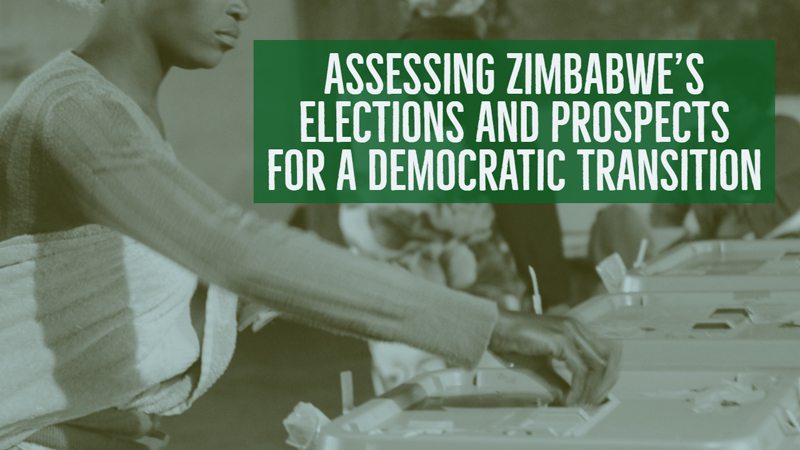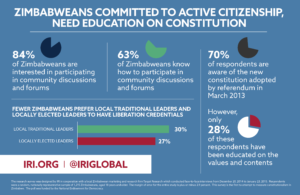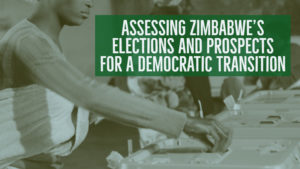
Amid indications that the first round of voting in Zimbabwe’s July 30 ‘harmonized’ elections may not produce a clear winner, some civil society groups started putting together building blocks for a transitional authority — modeled along the lines of the 2009 to 2013 government of national unity (GNU) in which former president Robert Mugabe shared power with his nemesis, Morgan Tsvangirai — the late founder of the MDC, according to the Daily News.
There have been exploratory discussions involving leading civil society opinion leaders and liberals across the political divide to prepare the nation for a post-election period in the event that the July 30 poll produces a contested outcome, it adds.

Dr Alex Magaisa
But some democracy advocates fear that compromise with the ruling ZANU-PF will prevent the next government from initiating essential reform.
According to Dr. Alex Magaisa, who served in the previous GNU, “nothing short of a fundamental overhaul in the way government works is needed to move Zimbabwe forward.”
“It needs disruption and a new approach,” he added. “After 38 years in power, I struggle to imagine that ZANU PF is the right agent for the kind of disruption that is required.”
Seven weeks before the poll, two prominent international democracy groups are urging the government and its Zimbabwe Election Commission (ZEC) to ensure reforms that guarantee a credible election:
The elections – for presidential, legislative and local office – will take place less than a year after the military intervention that led to Robert Mugabe’s removal from power after 37 years, and the appointment of President Emmerson Mnangagwa keeping the Zanu PF party in power. The elections also follow 18 years of political crisis, the International Republican Institute (IRI) and the National Democratic Institute (NDI) noted in their joint report.
 “While the IRI-NDI delegation found several notable improvements in the political environment and electoral preparations as compared to prior elections, a number of significant opportunities to break with the past have been missed,” said former U.S. legislator David Dreier, a member of the assessment team. “As a result, we still have concerns about the fairness of the process.”
“While the IRI-NDI delegation found several notable improvements in the political environment and electoral preparations as compared to prior elections, a number of significant opportunities to break with the past have been missed,” said former U.S. legislator David Dreier, a member of the assessment team. “As a result, we still have concerns about the fairness of the process.”
Zimbabwe’s military must respect the outcome of the elections, added NDI and IRI. “Military officers and government officials should refrain from any statements suggesting that the military would not accept the outcome of the election,” the organizations said.
 But the Institute for Security Studies (ISS) has questioned the Zimbabwe National Army’s ability to explicitly stay clear of the southern African country’s forthcoming election – regardless of its outcome, NEWS 24 adds. In an interview with News24, Senior researcher at ISS, Derek Matyszak said that there was need for the Zimbabwean military to stay clear of politics if the country was to hold a credible election.
But the Institute for Security Studies (ISS) has questioned the Zimbabwe National Army’s ability to explicitly stay clear of the southern African country’s forthcoming election – regardless of its outcome, NEWS 24 adds. In an interview with News24, Senior researcher at ISS, Derek Matyszak said that there was need for the Zimbabwean military to stay clear of politics if the country was to hold a credible election.
“It is important that the military publicly announces its pledge to stay clear of politics regardless of the election results. They have often been meddling in politics in the past and have just recently done that when they stepped in last year,” said Matyszak.
ASSESSING ZIMBABWE’S ELECTIONS AND PROSPECTS FOR A DEMOCRATIC TRANSITION
 Zimbabwe’s elections offer the promise of a democratic breakthrough. The people of Zimbabwe have seen encouraging signs including promises of reform by President Emmerson Mnangagwa, shifting political alignments vying for power, and the number of registered voters increase. Even so, Zimbabweans have reason to remain skeptical. The pace and extent of reform is unclear, and rigging and violence have marred past elections.
Zimbabwe’s elections offer the promise of a democratic breakthrough. The people of Zimbabwe have seen encouraging signs including promises of reform by President Emmerson Mnangagwa, shifting political alignments vying for power, and the number of registered voters increase. Even so, Zimbabweans have reason to remain skeptical. The pace and extent of reform is unclear, and rigging and violence have marred past elections.
Yet, the perception of a potential opening has led regional actors and the international community to become more engaged in the country. Pre-electoral assessment missions by NDI and IRI have just returned from Zimbabwe, and business and labor groups are preparing to make significant contributions to the elections. At this forum, leading political scientists, policy-makers, and activists will provide an assessment of the prospects and challenges Zimbabwe will face during the election period.
Panel I: An assessment of the pre-election environment
- Elizabeth Lewis, Deputy Director for Africa, International Republican Institute (IRI)
- Imani Countess, Africa Program Director, Solidarity Center
- Lars Benson, Regional Director for Africa, Center for International Private Enterprise (CIPE)
Panel II: Looking beyond the election: Prospects for a democratic transition
- Ibbo Mandaza, SAPES Trust
- Alex Magaisa, Reagan-Fascell Fellow at the National Endowment for Democracy (NED)
- Irene Petras, Former Director, Zimbabwe Lawyers for Human Rights
June 14, 2018. 12:00 pm – 04:00 pm
Please note: This event will be held at the International Republican Institute,
1225 I (Eye) Street NW, Suite 800, Washington, DC 20005.
All cameras and media must register with NED public affairs. Please email press@ned.org to register as a member of the press. Twitter: Follow @NEDemocracy and use #NEDEvents to join the conversation.







